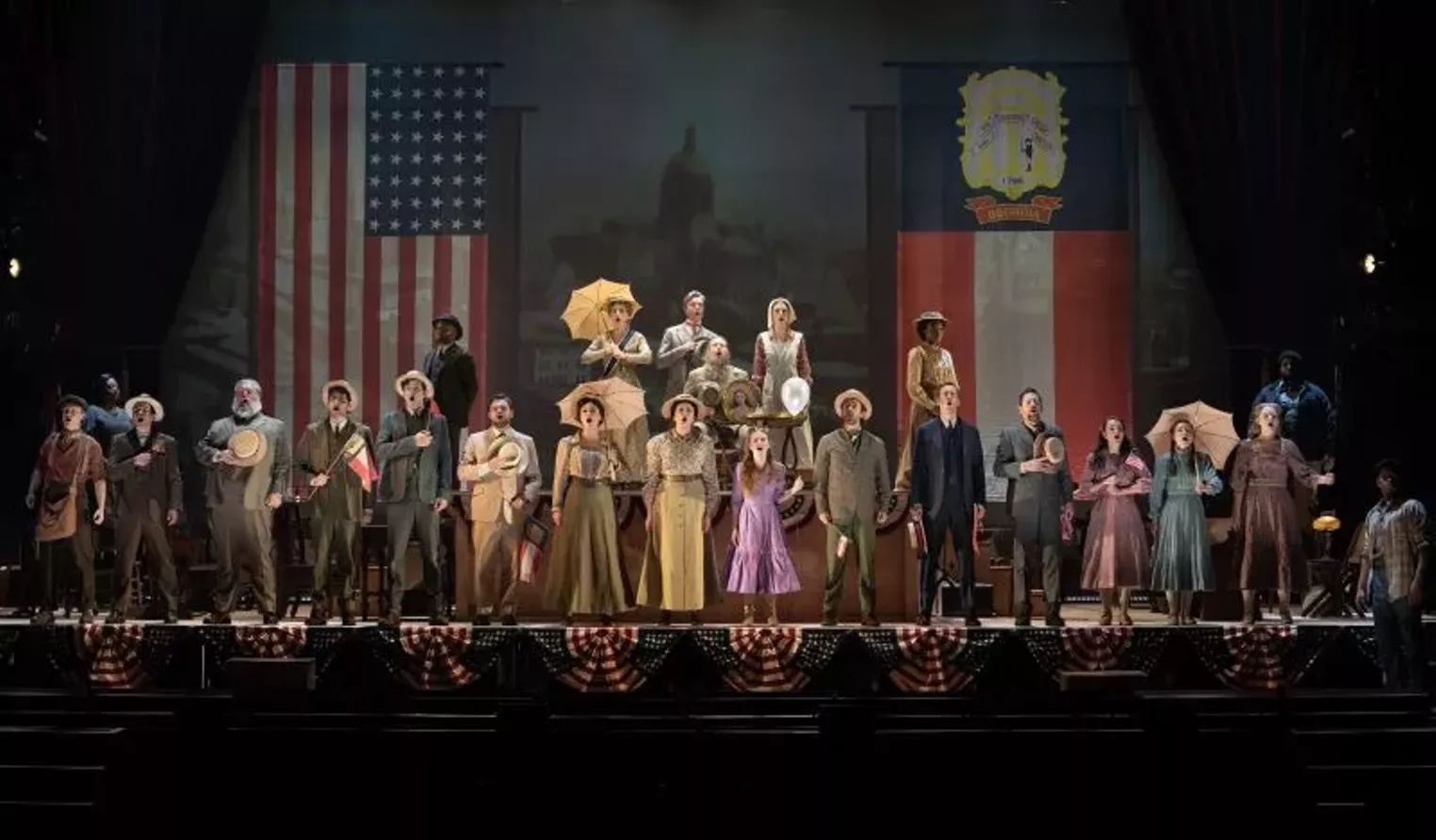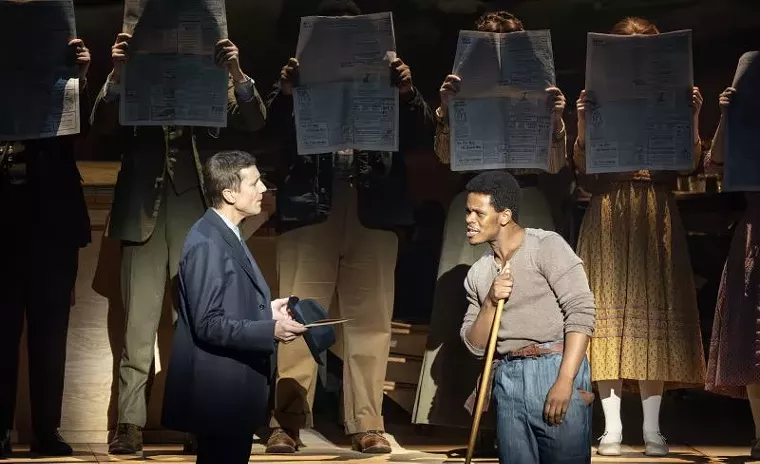There’s enough perturbances in Act I of Parade to offend and/or upset just about everyone in the audience. But then the winner of the 2023 Tony Award for Best Revival of Musical isn’t here to make things easy for us.
This is a true story, after all, one that shines a light on some of America’s darkest impulses. Past and, unfortunately, present. And if you give it a little patience and acceptance, you’ll find it’s a handsome, remarkably prescient show that treats us like the thinking, worldly, engaged adults we hopefully are.
After an innocent 13-year-old Mary Phagan is found dead at the Atlanta pencil factory where she works, her Brooklyn-transplant Jewish boss, Leo Frank, is accused of rape and murder. In the 1913 trial that grips the nation, Frank is convicted despite a lack of concrete evidence, thanks to a prosecuting attorney unafraid to threaten, coach, or pay off his witnesses.
It doesn’t hurt that the accused is Jewish, and a Yankee to boot. The South may have lost the Civil War, but they haven’t lost their hatred of Northerners, and more importantly in this trial, a dislike of Jews.
Years of appeals finally leads the Governor to commute the sentence, much to the outrage of the town. Infuriated the death penalty was off the table, an angry mob kidnaps Frank and lynches him.
The show’s creators, book by Alfred Uhry, music and lyrics by Jason Robert Brown, co-conceived Harold Prince and directed by Michael Arden, do very little to welcome us warmly into the show’s world.
Progressives will hate all the confederate flag waving that populates the show’s two opening Southern/Atlanta proud numbers, “The Old Red Hills of Home” and “The Dream of Atlanta.”
Those that need a likeable main character to cheer for will bristle at Leo’s cold/brittle/condescending tirade about how louche/lowbrow he finds the South in “How Can I Call This Home.” If that doesn’t bother them, they certainly won’t like his indifferent dismissal of his wife, Lucille in “Leo at Work/What am I Waiting For?”
Jews (or at least this Jew) will take umbrage at Leo’s whiny, nebbishy, work and money-obsessed portrayal, which seems to play into every prejudicial Jewish stereotype.
From the South? You won’t like that Frank seems to be right in calling out southerners as yahoos, focused on celebrating a war they didn’t win (the Memorial Parade) and hating others/using that hate to further ambitions (too many songs to mention for this one).
Andrew Samonsky, Ramone Nelson and company in the National Tour of Parade.
Photo by Joan Marcus
Then there’s the black characters in Act I. Voiceless servants or lying witnesses without exploration of what it meant to be Black in 1913 Georgia—a most glaring and uncomfortable omission.
Finally, of course, the murder itself. Hauntingly staged without an ounce of tear-jerk to it. The awfulness of it hangs over us as the injustices pile on themselves. Being “entertained” by such tragedy isn’t everyone’s cuppa.
By the time Act I ends with Frank’s mockery of a trial, we are covered in ick.
It’s no wonder, then, that many folks didn’t make it to Act 2 on opening night. Too depressing. Too creepy. Both were excuses given. And hey, if going to a musical is about escaping the world, or delighting in fantasy, by all means, go cool off the car and head home.
Gosh – even Come from Away, a musical about 9/11, lets us laugh and sends us off with a positive feel-good takeaway.
But here’s where I implore you – put on your big boy/girl pants and stick around. Parade is a slow burn that solves many of the prickly points as it moves ahead. And if doing so, does something crucial and dare I say, magical.
The Black voice is finally heard post-intermission in “A Rumblin ‘and a Rollin,” a much-needed take-down of the white powers that be.
Leo (played by understudy Ethan Riordan opening night) softens his shell so we can empathize. His wife Lucille (played by understudy Jenny Hickman opening night) not only proves that women get things done, but effectively steals the show with angry, belt-it-out numbers like “Do it Alone” and the joyous hopefulness of “This is Not Over Yet.”
We go from facts to facets and attach to our hero and heroine, even as things look dire. This is the investment we’ve been waiting for and the show delivers.
Those detestable southerners, there are many still there. Corrupt prosecutor Hugh Dorsey (an oily Andrew Samonsky) emerges as the true villain of the story. But some step up to the plate to surprise you. The Governor (a charismatic Chris Shyer) shines some hope in the halls of politics and justice.
Plus, the show looks and sounds great.
Dane Laffrey’s design, featuring a single pine riser that serves as the center court for all scenes, is flanked by a cluttered mass of mismatched chairs, moodily lit by Heather Gilbert. The undone set gives the musical a heart-squeezingly intimate feel, placing us very much in the action with all the characters.
Projections (by Sven Ortel) of the real-life characters in the musical populate the show, constantly reminding us of the story’s truth and urging us to hold space for what transpired, even if it’s uncomfortable at times.
With a luxurious song list that samples from all forms of the American musical vernacular, from blues to jazz to Dixie to belt ’em out Broadway numbers, there isn’t a clunker in the bunch. Nor is there a weak link in the cast.
It might feel odd to want to clap at the end of many of these numbers given the subject matter, but we’re moved to do so time and time again.
Besides, clapping lets off some steam as we know what’s coming. And it’s what’s coming that is the real point and importance of this show.
Parade may be a history show, but it’s also a warning shot for the times we presently live in—ambition and power using prejudice to manipulate facts and stir an angry mob into action. Sound familiar?
The musical never explicitly implies that history teaches us that we learn nothing from history. That’s your homework to do if you choose so. It’s also the musical’s magic of implication without lecture. There will be no preaching as we walk out the door.
But Parade does demand we sit in the discomfort of injustice born and ask ourselves if this is what we are OK with. If this is what America was, are we comfortable with it being what America possibly is or will be?
Parade continues through July 20 at the Hobby Center, 800 Bagby. For more information, call 713-316-7625 or visit thehobbycenter.org or broadwayatthehobbycenter.com. $53.25-$128.

